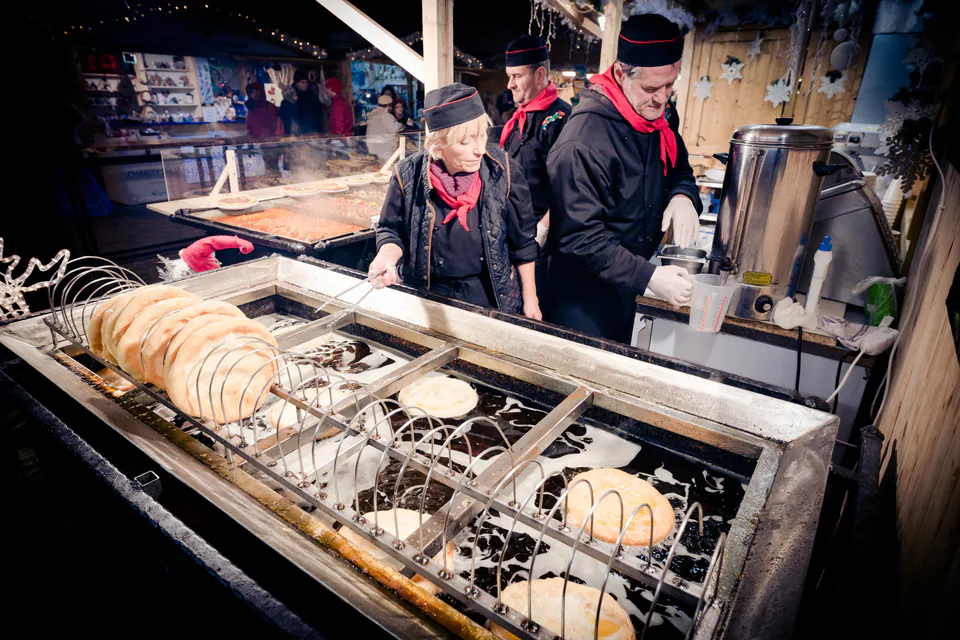A Three-Day Itinerary to Discover Budapest's Iconic Landmarks and Culture
Budapest is one of those cities that just hits different. The Danube River splits this amazing place into two totally different personalities: you've got historic Buda with its castle up on the hill, and then there's buzzing Pest with its busy streets and those famous ruin bars everyone talks about. Three days gives you enough time to see the main stuff without feeling like you're rushing around like crazy.
We've put together this itinerary to mix the big tourist spots with some real local experiences. You'll soak in thermal waters that have been around for centuries, walk through the Jewish Quarter with its heavy history, and trust us, you'll want to catch sunset from Fisherman's Bastion. Plus you'll see why Parliament is so gorgeous and figure out what all the fuss is about with Budapest's ruin bars.
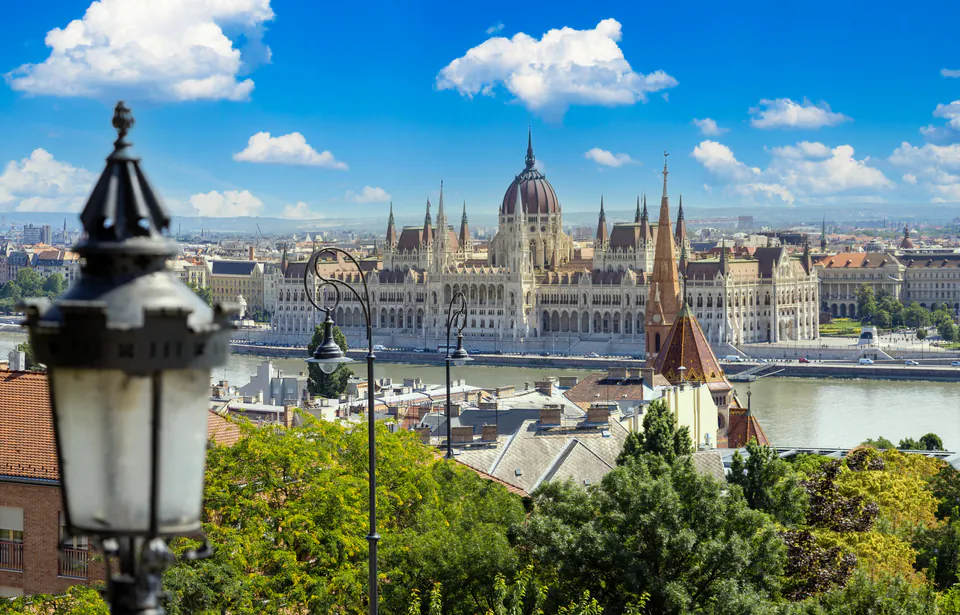
Getting Ready for Your Trip
Buda vs Pest - What's the Deal?
So here's the thing about Budapest that confused us at first. The Danube River basically cuts the city in half. On the west side, you have Buda where all the old royal stuff is. Think castle, cobblestone streets, and it gets pretty quiet at night. On the east side is Pest, which is where most of the action happens. That's where you'll find Parliament, tons of restaurants, and most hotels.
We learned pretty quickly that it makes sense to group your activities by which side you're on. You don't want to be crossing back and forth all day.
Money Stuff You Should Know
Hungary still uses their own money, the Forint (HUF). Right now it's about 375-400 HUF for 1 Euro. Most places take credit cards but definitely bring some cash. We'd say 10,000-15,000 HUF should cover you for markets, small cafes, and tips. Don't change money at the airport if you can help it - the rates are terrible.
For tipping, 10-15% is normal at restaurants. But always check your bill first because sometimes they already add service charges. Oh, and if you say "Jó napot kívánok" when you walk into shops, people really appreciate it.
Getting Around the City
Budapest has really good public transport. We always get the 72-hour travelcard for 5,500 HUF because you can use it on everything - metro, trams, buses. The M1 metro line hits a lot of tourist spots along Andrássy Avenue, and Tram 2 gives you amazing views along the Danube.
There's also this Budapest Card thing for 27,990 HUF that includes transport plus free entry to some museums and thermal baths. We usually calculate what we want to see and figure out if it's worth it.

Book These Things Now
Parliament tours sell out like crazy, especially the English ones. Go to jegymester.hu and book as soon as you know your dates. Thermal baths are also better to book online, especially on weekends. And if you want to do a dinner cruise or see a show, don't wait.
Day 1: Checking Out the Royal Side
Morning: Castle Hill Adventures
Start your Budapest trip up on Castle Hill where all the royal history stuff is. Get there early to beat the crowds and the light is really nice in the morning.
Buda Castle is this massive UNESCO site that you can see from everywhere in the city. You can walk around the courtyards and terraces for free, and the views of the city are incredible. The Lion Courtyard and Savoyai Terrace are our favorites. Inside, there's the Hungarian National Gallery and Budapest History Museum if you want to learn more about Hungarian art and how the city developed from Roman times.
The Hungarian National Gallery has this amazing collection in what used to be the throne room and royal chambers. Pretty cool to see medieval art in actual royal rooms. The Budapest History Museum shows you restored medieval chambers and Gothic statues that really bring the castle's history to life.
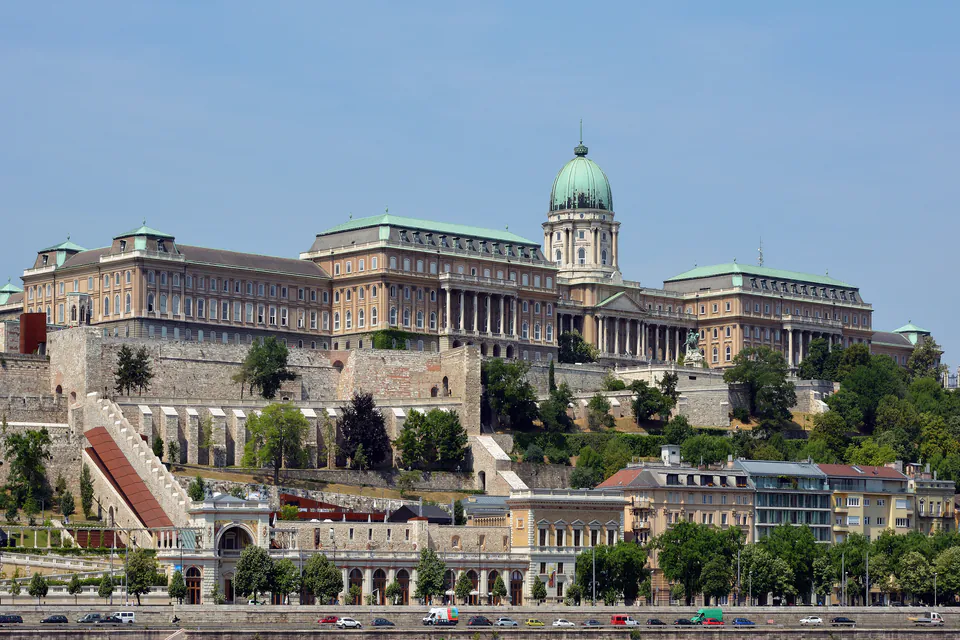
Matthias Church is gorgeous with its colorful Zsolnay tile roof. This church is 700 years old and has seen royal coronations and weddings, including Franz Joseph I and Charles IV. The inside is really beautiful with frescoes and stained glass, and there's a little museum in the crypt with church treasures.
Fisherman's Bastion is where everyone goes for those classic Budapest photos. The seven white towers represent the Magyar tribes that settled here, and you get perfect views of Parliament across the river. The lower parts are free and you can go anytime, but the upper viewing areas cost money during the day.
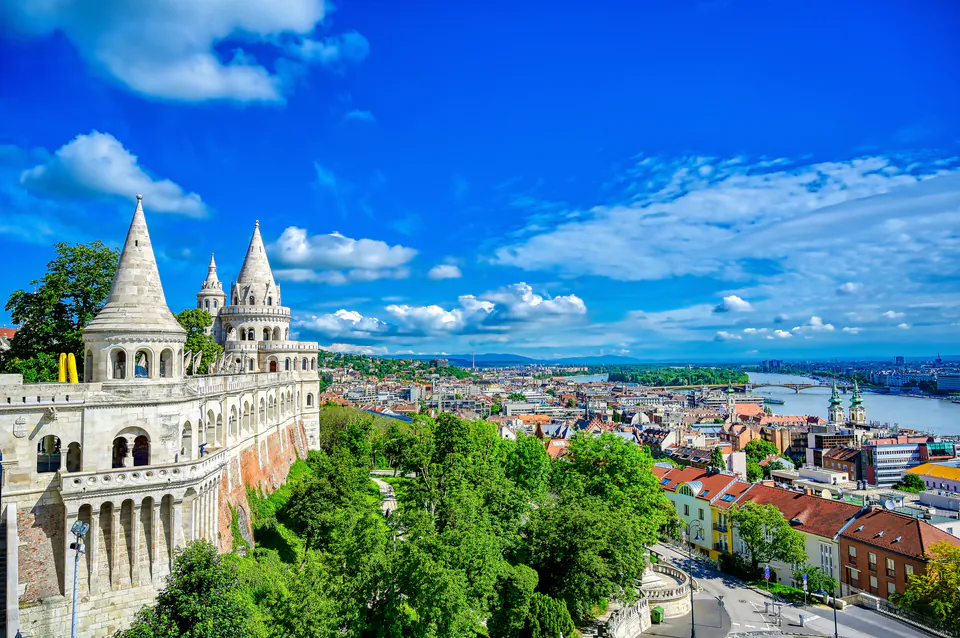
Afternoon: Chain Bridge and River Walk
Take the old funicular down to Clark Ádám Square where Budapest's oldest bridge is waiting for you. The Chain Bridge was the first permanent bridge connecting Buda and Pest back in 1849. There are stone lions guarding both ends (locals say they don't have tongues), and you get great views of both the castle and Parliament from the bridge.
Walk across slowly and stop in the middle for photos. The bridge looks amazing at sunset when all the lights come on and reflect in the water.
Evening: River Cruise Time
When it starts getting dark, hop on a river cruise to see Budapest from the water. These usually last about an hour and show you the UNESCO riverfront as all the buildings light up. Seeing Buda's historic outline against Pest's grand buildings is pretty unforgettable.
We always try to time it around sunset. You see the city in daylight, watch the sunset over the Buda hills, then see everything lit up reflecting on the water. Most cruises have audio guides and give you a welcome drink while you take tons of photos.
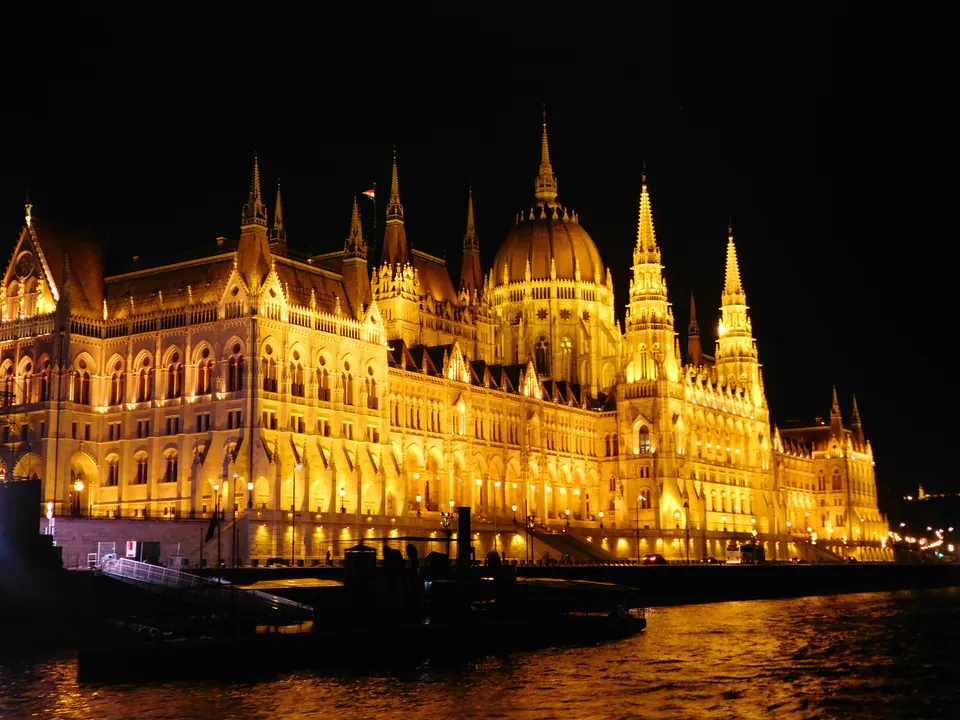
Day 2: Pest's Amazing Buildings
Morning: Parliament and Heavy History
Cross over to Pest to see one of Europe's most beautiful government buildings. The Hungarian Parliament Building is this incredible neo-Gothic masterpiece with a 96-meter dome that's exactly the same height as St. Stephen's Basilica. They did that on purpose to show equality between government and church.
The inside tours are amazing. You see the Main Staircase, the Dome Hall where they keep the Hungarian Holy Crown and royal jewels, and the fancy Old Upper House Hall. Tours are 45 minutes but you really need to book way ahead because English tours sell out months in advance.
After Parliament, walk south along the river to the Shoes on the Danube Bank Memorial. It's sixty pairs of 1940s iron shoes that remember Jewish victims who were shot into the Danube during World War II. It's simple but really powerful, and makes you think about the city's difficult history.
Afternoon: Big Church and Beautiful Streets
St. Stephen's Basilica is Hungary's biggest church and can fit 8,500 people. The inside is really fancy with marble, mosaics, and sculptures everywhere. The Chapel of the Holy Right Hand has Hungary's most important relic - the preserved right hand of St. Stephen, who was the first Christian King of Hungary.
You can go up to the Panorama Terrace in the dome for 360-degree views of the city. The dome is exactly 96 meters high, same as Parliament, which shows the balance between church and state in Hungary.
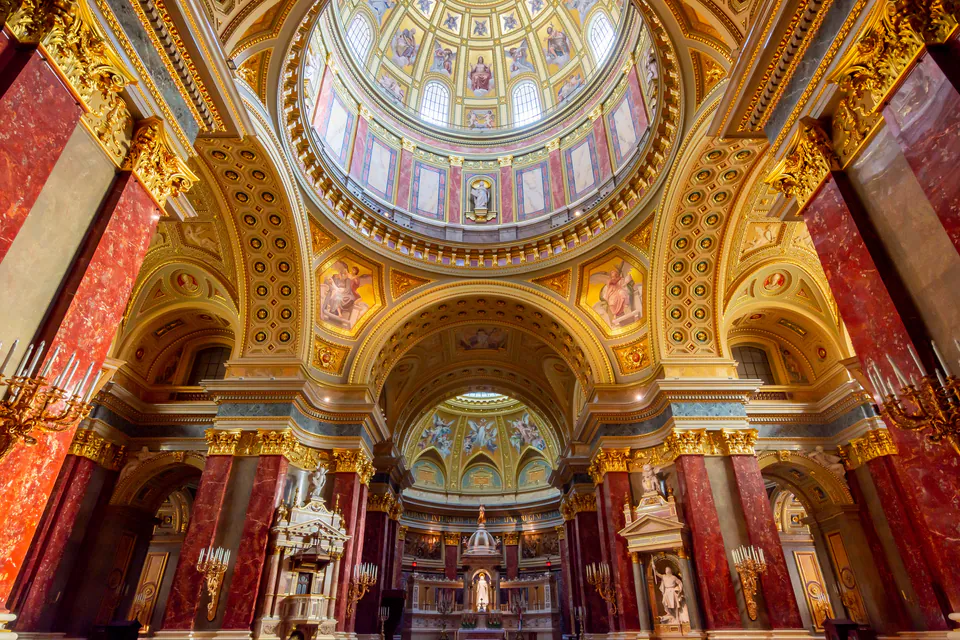
From the Basilica, walk down Andrássy Avenue, which is Budapest's fanciest street and a UNESCO site. This elegant boulevard has beautiful mansions, embassies, and upscale shops. The Hungarian State Opera House is an architectural gem designed by Miklós Ybl and is considered one of Europe's finest examples of neo-Renaissance architecture.
Evening: Jewish Quarter Exploration
Head into the historic Jewish Quarter (Erzsébetváros) to see both sad history and cool modern culture. The Dohány Street Great Synagogue is Europe's largest synagogue and has this striking Moorish Revival architecture that represents Budapest's once-huge Jewish community.
The ticket includes the beautiful synagogue interior, Hungarian Jewish Museum about local Jewish history, Heroes' Temple, the unusual Jewish Cemetery, and the moving Raoul Wallenberg Memorial Park. The "Tree of Life" sculpture has metal leaves with names of Holocaust victims, which is really powerful.
The Jewish Quarter becomes Budapest's food and nightlife center after dark. Try modern Hungarian-Jewish food at Gettó Gulyás, enjoy Middle Eastern flavors at Dobrumba, or check out the stylish Mazel Tov with its beautiful leafy courtyard.
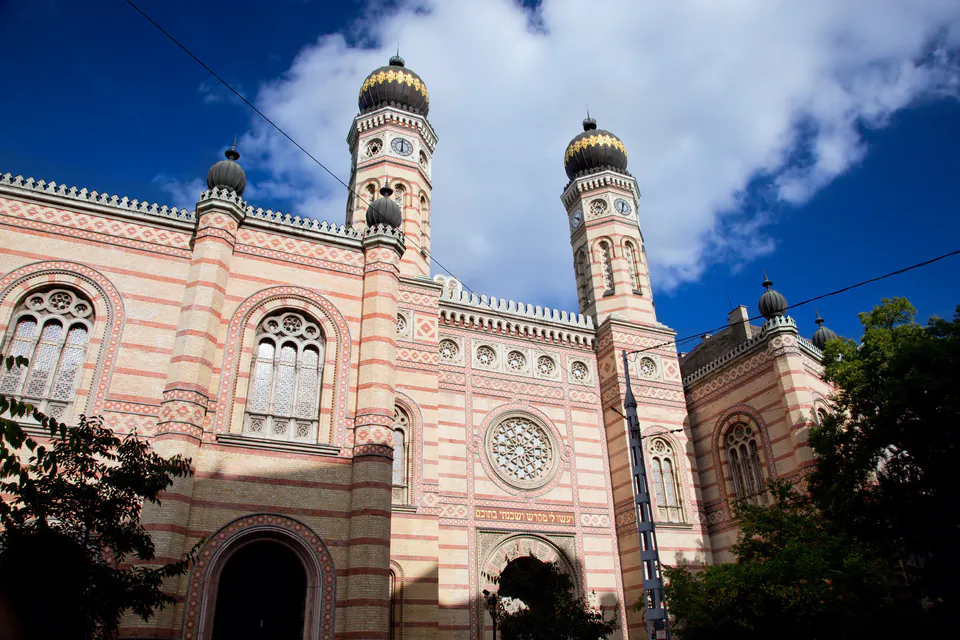
Day 3: Hot Springs and Local Food
Morning: Thermal Bath Experience
You can't visit Budapest without trying the thermal baths. It's like a requirement. You can choose from three different bath experiences, each with its own vibe and healing waters.
Széchenyi Thermal Bath is the classic Budapest bath experience and Europe's biggest medicinal complex. This neo-Baroque "bath palace" has three huge outdoor pools that stay open all year, including the famous thermal pool where locals play chess on floating boards. There are eighteen pools total with temperatures from 18°C to 40°C, plus saunas and steam rooms.
Gellért Thermal Bath is like the "Palace of Baths" with incredible Art Nouveau architecture. The Zsolnay ceramic mosaics, marble columns, and stained glass windows make it feel almost like a cathedral. The outdoor wave pool is seasonal and was one of the world's first when it opened in 1927.
Lukács Thermal Bath gives you the most authentic local experience and is famous for healing properties. You can see marble "thank you" tablets from grateful visitors all over the walls. This historic bath has way more locals than tourists, so you get to see real Budapest thermal culture.
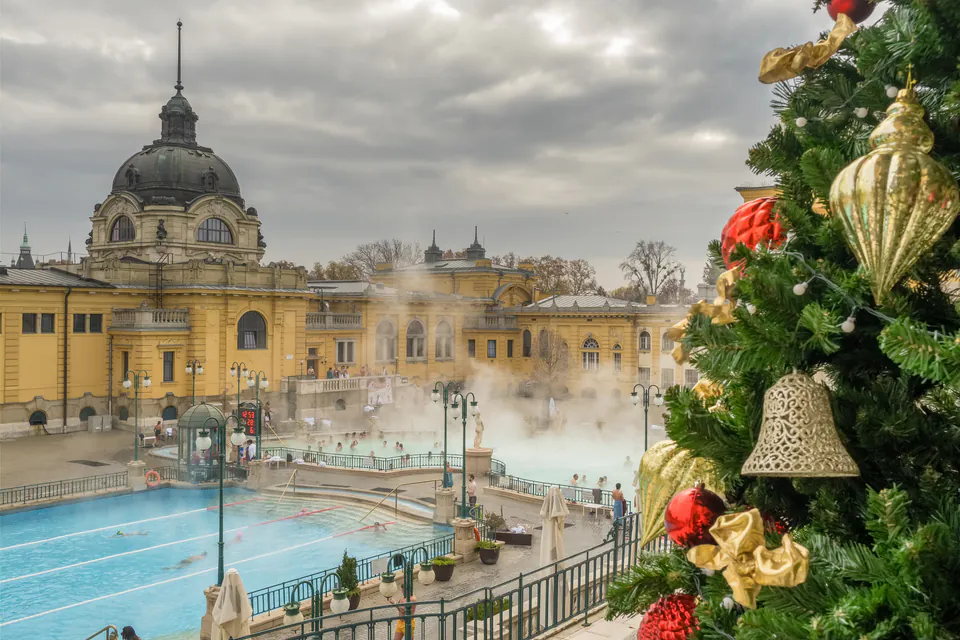
Budapest Thermal Baths Comparison
| Feature | Széchenyi | Gellért | Lukács |
|---|---|---|---|
| Architecture | Neo-Baroque palace | Art Nouveau with Zsolnay mosaics | Traditional historic complex |
| Atmosphere | Social, iconic, bustling | Elegant, ornate, serene | Authentic, local, healing-focused |
| Unique Features | Outdoor chess, Sparty nights | Wave pool, historic design | Thank you tablets, local vibe |
| Price (HUF) | 11,000-13,500 | 12,500 | 5,500 |
| Budapest Card | 20% discount | 20% discount | FREE entry |
Afternoon: Great Market Hall Food Adventure
The Great Market Hall (Nagy Vásárcsarnok) is both an architectural wonder and food paradise. This neo-Gothic building with its distinctive Zsolnay-tiled roof houses Budapest's biggest and most famous indoor market. It's a great slice of everyday Hungarian life.
The ground floor has fresh produce, meats, and Hungarian specialties. Look for colorful paprika in decorative tins, famous Pick Salami, strong Pálinka fruit brandy, and tons of pickled vegetables. We're not just talking pickled cucumbers here - pickled peppers, cabbage, watermelon, and paprika-stuffed cabbage create this amazing colorful display in the basement.
The upper floor food court is perfect for lunch with authentic Hungarian street food. Try lángos - deep-fried dough usually topped with sour cream and cheese - plus hearty goulash, stuffed cabbage, various sausages, and sweet rétes (strudel) in lots of flavors.
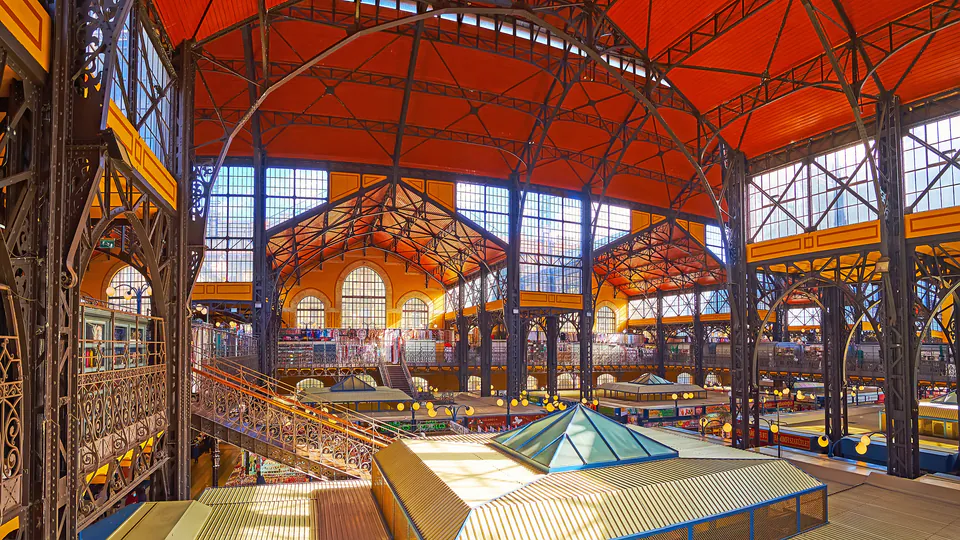
Evening: Ruin Bars or Cultural Shows
Your last evening in Budapest gives you two totally different cultural experiences, both really Hungarian.
Ruin Bar Adventure gets you into Budapest's unique modern thing. These atmospheric places came from abandoned buildings in the Jewish Quarter, turning run-down courtyards into eclectic bars filled with mismatched furniture, weird art, and bohemian charm.
Szimpla Kert is the legendary pioneer from 2002 that spreads through multiple rooms and courtyards, each with different themes. The deliberately messy look and welcoming atmosphere attracts everyone from locals to tourists. Instant-Fogas is a massive multi-level party place with tons of dance floors, while Mazel Tov is more upscale with beautiful plant-filled courtyards and Middle Eastern food.
Hungarian Cultural Performance gives you a traditional alternative with energetic folk dance shows featuring professional dancers in colorful costumes with live folk musicians. Classical concerts in stunning venues like St. Stephen's Basilica or Matthias Church offer another cultural dimension, showing off Budapest's distinguished musical heritage in architecturally magnificent settings.
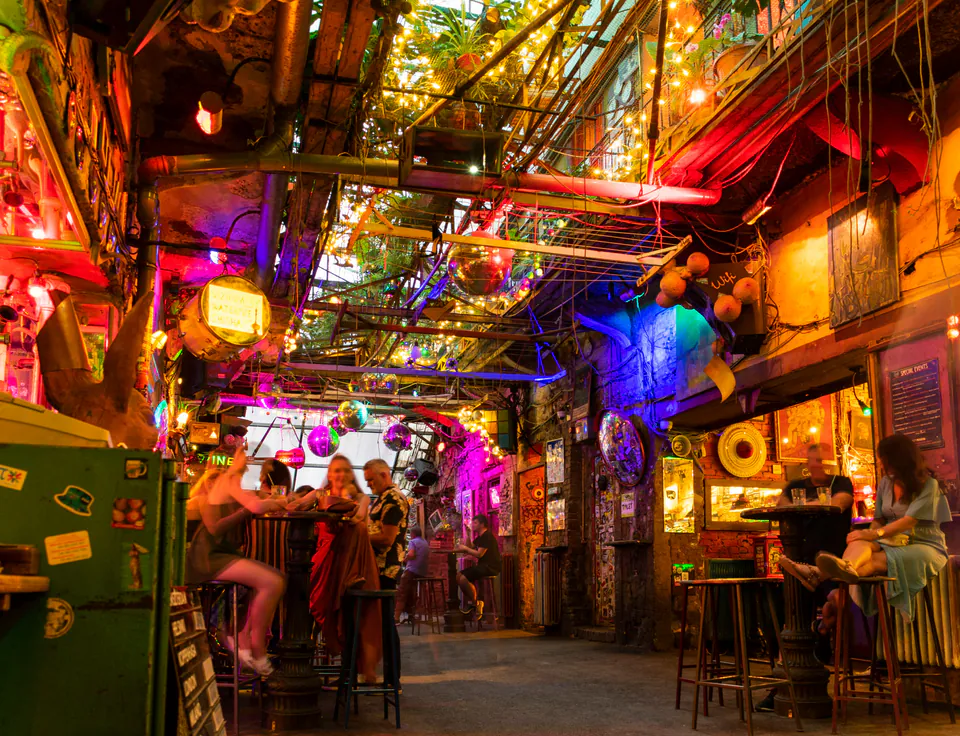
Getting Around and Practical Stuff
Budapest's BKK public transport system connects all the places in this itinerary really well. The M1 (Yellow Line) metro goes to Castle Hill via Clark Ádám tér, Andrássy Avenue attractions, and Széchenyi Baths. Tram 2 gives you scenic Danube views with amazing castle and Parliament views.
Single tickets cost 450 HUF from machines or 600 HUF from drivers. Always validate tickets in those orange machines at metro entrances or on trams and buses. The 72-hour travelcard (5,500 HUF) gives you unlimited travel and is great value for three-day visits.
Night buses keep running late, which is really useful after ruin bar exploration. The night network centers on Deák Ferenc tér and Astoria, with routes running until early morning.
Budget Tips and Saving Money
Smart planning helps you get the most out of Budapest while keeping costs down. The Budapest Card gives you good value if you visit multiple included attractions. Lukács Bath (normally 5,500 HUF), National Gallery (4,200 HUF), and History Museum (3,800 HUF) alone justify much of the 72-hour card cost.
We discovered that evening access to Fisherman's Bastion upper terraces often becomes free after 7 PM, so you can get budget-friendly sunset and night photos. Many churches have free entry outside service times, and the castle courtyards and riverside walks cost nothing but give you great experiences.
Local markets and traditional étkezde (eating houses) have authentic meals at way less than tourist restaurant prices. The Great Market Hall's upper floor gives you excellent value Hungarian specialties in a cool atmosphere.
